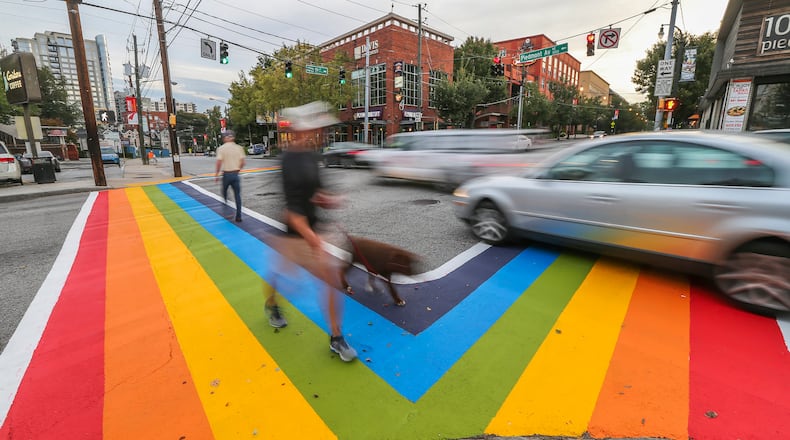Joy Green is 30, queer, Black and proud of every one of the attributes that make up who she is.
Born in New York, her family moved to Atlanta when she was 11 and she went to school in Midtown. Identifying as pansexual, Green said she was able to navigate being part of the LGBTQ+ community because of the strong support she received from her family and a city that didn’t make her sexuality alien.
“Being in the family that I was in, with the mother I had, I had the freedom to identify the way I wanted to and didn’t have to battle shame,” said Green, who acknowledged that her New York roots and growing up in a urban bubble like Atlanta may not reflect the reality of others.
“I was able to consider that I was experiencing attraction differently without the noise,” she said.
Credit: HYOSUB SHIN / AJC
Credit: HYOSUB SHIN / AJC
A recent survey of more than 1,300 people who identify as members of the LGBTQ+ community in the south found both joy and pain in being queer — in 14 states, from Virginia to Texas.
The majority of respondents said that being LGBTQ+ is a positive and feel accepted in their workplace, according to the survey, conducted by the National Center for Civil and Human Rights LGBTQ Institute and Emory’s University’s Goizueta School of Business.
Atlanta came out as the south’s most accommodating city to the LGBTQ+ community, followed by Asheville, New Orleans and Key West, Florida.
But transgender men and women often eschewed seeking health care in the south because of discrimination, and many southern gays said bullying is a major problem in the region’s schools.
Transgender and non-binary people between the ages of 18-29 also were more likely to say they felt unwelcome at religious gatherings, which is a huge concern given the outsized role spiritual institutions play in southern society.
“A lot of times when we think about LGBTQ America, we often think of the coasts, of San Francisco, of New York,” said Tim’mT. West, executive director of the LGBTQ Institute. “But what we also know to be true is that a third of the U.S. population that we know to be LGBTQ lives in the American south.”
Credit: National Center for Civil and Human Rights
Credit: National Center for Civil and Human Rights
The survey — which follows an earlier study by the civil and human rights center from 2018 — comes as the LGBTQ+ community has in recent years been in the line of fire of politicians who seek to turn back its gains, especially in transgender healthcare, education and inclusion.
A religious liberty bill and legislation that would regulate gender identity discussions in state classrooms stalled during the recent Georgia legislative session.
But Gov. Brian Kemp in March signed into law a ban on providing certain hormones or surgical treatment to minors to align with their gender identity. It is legislation decried by LGBTQ people.
“The south is also the site of the majority of 400 bills proposed that are anti-LGBTQ,” West said. “So you have this confluence of a stronghold of LGBTQ people who live in the south and at the same time they face mounting adversity and challenges.”
Credit: Arvin Temkar/AJC
Credit: Arvin Temkar/AJC
The survey, which was conducted between June 2021 and March 2022, also found that gay southerners said they were often the butt of slurs and jokes, received poor service in restaurants and hotels, and avoided school activities because of their identity.
Rural respondents also had a greater feeling of social acceptance in their areas compared to those in metro regions. West theorized that in rural communities people get to know members of the gay community one on one, which makes it more difficult to see them as the “other.”
Of the respondents in the survey, the majority — 36 percent — were from Georgia. On the low end, only about 1% were from West Virginia and 1% from Mississippi.
Giacomo Negro, professor of organization and management and professor of sociology at Emory, said the survey stands out because of its size and focus on southern gays. Most national studies of the queer community usually contain small southern samples, making it difficult to extrapolate information on being LGBTQ+ below the Mason-Dixon line.
Credit: Emory University
Credit: Emory University
And among the surveys that do narrow their focus on LGBTQ people in the south, such as the U.S. Census, they look for specific, limited information, such as economic or marital status.
“Our survey is distinctive in a general sense in that it covers multiple domains of ordinary life,” he said.
That includes when respondents first believed they might be LGBTQ, their household income, if they were denied financial credit or a loan because they were perceived to be gay, if they were denied a job because of their orientation and if they had experienced depression or anxiety in the last 30 days.
What they found was the majority of respondents were politically engaged, identified as Democrats and are out more to friends and family than co-workers and extended family.
But the transgender community is struggling with the highest feelings of stigma, being rejected by a friend or family member and having their gender misidentified. In addition to the ban on offering hormones or surgical treatment to minors, the Georgia Legislature last year banned transgender girls from competing in high school women’s sports.
“The community that is certainly being hit the hardest right now are people who identify as trans or non-binary,” West said.
The city of Atlanta recently agreed to donate $55,000 for LGBTQ+ programs, especially those that address mental health challenges.
“We did think through these questions quite a bit,” Negro said. “What was interesting and relevant to think about is that the survey does paint a complex picture. Whereas we can think of many areas in which this population has faced barriers, limitations and discrimination in society, it has made progress.”
The researchers said they reached a diverse group of candidates for the study, including Asian, Latino and mixed-race. Of the respondents, 79% were white, 8% multi-cultural or other, 7% Black, 4% Hispanic and 2% Asian.
Minority participants were not representative of the population, “providing lower statistical certainty for the results of this group,” the researchers said.
A post-survey focus group of 37 queer people of color by the Institute and Ashlei R. Petion, assistant professor at Nova Southeastern University’s counseling department, found LGBTQ+ communities in the south suffer from a lack of diversity.
Akshaya Garmilla, 28, is one of them. As an Indian American bi-sexual woman, she said she participated in both the survey and focus group to expand the idea of who makes up the LGBTQ+ community and to counter the stereotypical portrayal of queerness as white and male.
“There is this messed up perspective that being out and proud is only reserved for our white counterparts,” she said. “In every kind of mainstream gay or trans movie, there’s usually a white lead. And those of us who are not white are plagued with generational trauma and lack of acceptance. Unfortunately in some cases that narrative is true, but the bad thing is it begins to define our relationships.”
The challenge for LGBTQ+ people of color is learning how to straddle race and sexuality.
“When I’m at a pride event and I’m one of the only brown people there, I’m going to find and usually talk to the other brown people,” Garmilla said.
But when she’s among other Asians, it’s her sexuality that can become the problem.
“It’s a little harder to be in that space sometimes because I think ‘You’re supposed to understand me,’” she said.
LGBTQ+ in the Southeast
The National Center for Civil and Human Rights and Emory University surveyed more than 1,300 people in 14 states across the south who identify as members of the LGBTQ+ community. Among the results:
° 96% of LGBTQ+ southerners are registered to vote
° 93% refused to purchase products from companies that don’t support LGBTQ+ rights
° 93% rewarded companies supportive of LGBTQ+ rights by purchasing their products
° 92% voted in the 2020 presidential election
° 82% attended rally or march supporting LGBTQ+ rights
° 78% reported being LGBTQ+ is a positive in their lives
° 56% say their workplace is accepting of their identity
° 53% reported being bullied in school for being LGBTQ+
° 31% of transgender respondents avoided healthcare for fear of negative reactions, unequal treatment
° 23% were 10 when they first thought they were LGBTQ+
SOURCE: The National Center for Civil and Human Rights and Emory University Goizueta Business School.
About the Author
Keep Reading
The Latest
Featured






